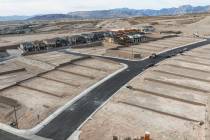Multifamily housing lures buyers
Multifamily housing was the hot investment on the final day of an auction of foreclosed Las Vegas commercial real estate properties and delinquent commercial loans valued at $1 billion, a broker for Colliers International said Thursday.
The Fountains at Flamingo, a 524-unit gated apartment complex east of the Strip, went for $32.5 million, or $61,832 a unit, said Gary Banner, who brought several clients to the auction table.
That's more than double the $15 million starting bid on a $50 million note balance. Banner gave a broker's price opinion, or estimated value, of $76,000 a unit at The Fountains.
"I think it's the better deal out of all the properties," Banner said on the final day of the auction. "They may be walking into a profit of $15,000 a unit."
The 272-unit Augusta Apartments in Henderson opened at $10 million and was bid up to $20.4 million, or $75,000 a unit, by early Thursday morning. Montego Bay Apartments, 420 units in Henderson, had a starting bid of $12 million on a non-performing note of $38 million and sold for more than $28 million.
Investors were "pretty aggressive" on the notes, with multifamily being the most sought-after, Banner said. At least four of the nine apartment complexes met their reserve, or the lender's minimum bid, he said.
Some 65 delinquent loans on office, retail, industrial and multifamily properties were offered during the three-day online auction, with a live bidding room at Cashman Center on the final day. About 500 bidders registered for the auction handled by Irvine, Calif.-based Auction.com.
While some properties sold well, not all moved. Advertised as a $1 billion sale, the auction resulted in sale of just over $330 million in notes, said Todd Gladis, senior vice president for the company.
Nine of 10 bank-owned properties were sold with a 66,000-square-foot retail center on St. Rose Parkway going for the highest price of $6.25 million.
The largest property on the auction block was the 29-acre Sahara Pavilion North retail center on the northeast corner of Sahara Avenue and Decatur Boulevard. It had a starting bid of $12 million on a $56 million nonperforming note. The property did not "trade," Gladis said.
Auction.com chairman Rob Friedman said he's seeing a lot of cash buyers.
"Bottom line, these buyers are getting great deals because the sellers are so motivated," Friedman said as he watched properties pop up on a screen at Cashman as bids came in. Each new bid reset the clock for three minutes.
"The underbidder has a chance to think, confer with his partners and potentially make a bid," he said. "It's exciting if you're online and in the game."
An investor who drove to the auction from Los Angeles said he was looking at a shopping center at 7865 W. Sahara Ave. with a starting bid of $600,000, but his partners told him they were hearing about better deals from other people.
Jeremy Foley, investment broker and leasing agent for Gatski Commercial in Las Vegas, said some investors shy away from auctions, while others see opportunity.
"The REO (real estate-owned) assets have enough due diligence material for investors to make intelligent decisions and accurately price the properties," Foley said of bank-owned properties. "In most cases, they've been given enough lead time to speak with the leasing and property management companies, walk the site, potentially talk to tenants -- although this is typically frowned upon -- and review the due diligence material."
Buying notes is on the opposite side of the spectrum, he said. Due diligence is just the beginning.
"Without being able to interview the tenants or leasing agents, it's nearly impossible to gauge the validity of the rent rolls," the broker said. "Any income information provided could potentially be flawed because the rent roll itself is incomplete. At the end of the day, the value of the majority of these properties is based upon income."
Note assets could potentially take a large and possibly needless discount without that information, plus there are legal concerns about the borrower throwing the property into bankruptcy, Foley said.
Banner of Colliers said that's often an owner's delay tactic, and that lenders and investors have been successful in recouping their costs in 90 percent of those cases.
"Where I see the positive side of this process, if it's successful, is basically unfreezing all the assets here in Vegas that we can't trade," Banner said. "We need that inventory movement and that velocity in the market. The noteholders want to recapitalize their investment and get it back to the market. Now we have assets in stronger hands to reposition the properties to resell them."
Commercial mortgage defaults in Las Vegas began increasing in late 2007, part of the $3.5 trillion wave of commercial real estate losses nationwide that some analysts predicted would be the "next shoe to fall."
Las Vegas real estate expert Richard Lee said he was surprised at how many properties were selling at the auction. Reserve prices were low enough to close the gap between ask and bid, he said.
"It looks like stuff is selling -- more than I expected. Now, selling and closing (escrow) are two different things," said Lee, marketing director of First American Title Co. of Nevada.
Buyers have 10 days to close on the notes and 30 days to close on REO properties, Friedman said.
Contact reporter Hubble Smith at hsmith@reviewjournal.com or 702-383-0491.
By the numbers
Sale price of The Fountains at Flamingo:
$32.5 million
Number of delinquent loans offered at auction:
65
Total amount of notes in auction, advertised as $1 billion sale:
$330 million

















